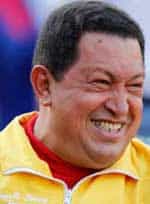Venezuela
By Antonio Guerrero
 |
|
Chávez: Economic |
Venezuelan president Hugo Chávez’s dream of spreading his “21st century socialism” throughout Latin America could be halted by a troubled economy. After he spent much of Venezuela’s oil windfall on gifts to socialist allies, Chávez’s dream is turning into a nightmare in the face of weakened oil prices, crumbling infrastructure and the global recession. After a 4.5% decline last year, Venezuela’s economy is expected to shrink by another 2% this year, making it the only Latin American nation still in full recession.
In January Chávez ordered a devaluation that cut the value of Venezuela’s currency, the bolivar, by 50%. The rate had been fixed at 2.15 bolivars per dollar since 2005. Under the new system, imports of priority goods, including food and medicine, have a preferential rate of 2.6 bolivars, while non-essential goods have a rate of 4.6 bolivars. With the devaluation boosting prices, Morgan Stanley predicts inflation will soar to 45% this year, after last year’s 27%. On a positive note, the bank says the devaluation will help the government meet debt payments through 2011, as it increases the local currency value of oil exports, which account for more than 90% of total exports.
With the devaluation unleashing panic buying, though, Chávez has moved to close some 70 businesses for alleged price gouging, including a supermarket chain controlled by France’s Casino Guichard-Perrachon retail group. After nationalizing several banks and acquiring Santander’s Banco de Venezuela, the administration now controls some 25% of the nation’s banking system.
The government’s nationalization of the electricity grid in 2007 is adding to its growing problems. Having failed to expand two hydroelectric dams that account for more than 70% of the country’s electricity, the government ordered rolling blackouts amid an energy crunch. An ongoing drought is further threatening hydroelectric output.
Despite the turmoil, Chávez’s popularity rating remains close to 50%.



